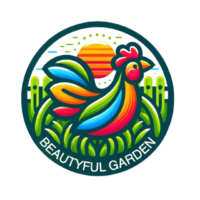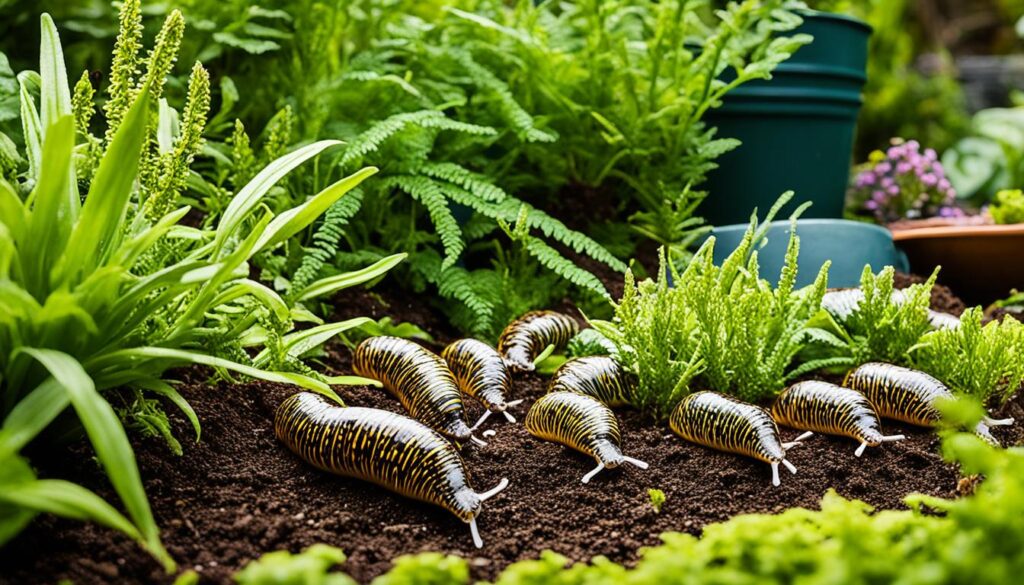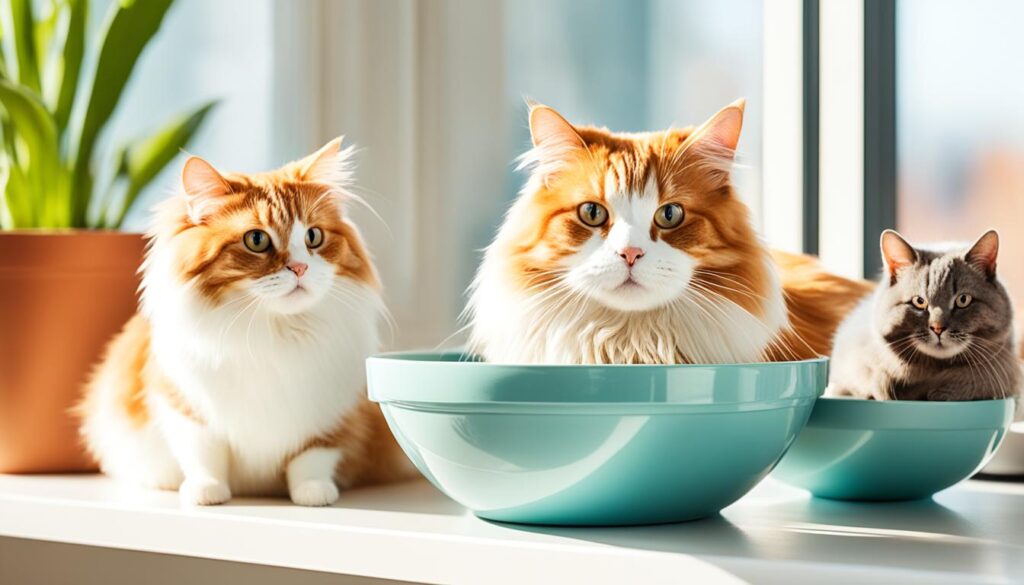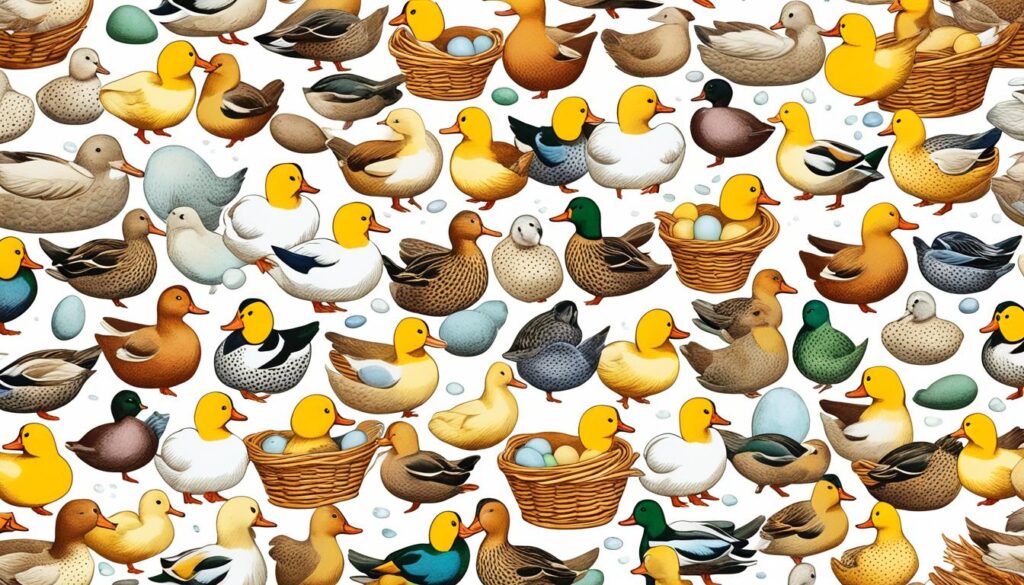Did you know a single garden can have thousands of slugs? These pests harm your plants and can be dangerous to pets. Slugs carry lungworm, which can be deadly to dogs if not treated. To keep your pets safe and your garden healthy, finding pet-friendly ways to get rid of slugs is key.
We’ll look at natural, safe, and eco-friendly ways to get rid of slugs. Methods include using sharp barriers and setting up beer traps. These organic deterrents are both effective and safe for pets.
Key Takeaways:
- Slugs and snails carry a dangerous parasite called lungworm that can be fatal to dogs.
- Natural slug repellents like eggshells, coffee grounds, and rosemary can effectively deter slugs without harming pets.
- Beer traps and biological controls like nematodes provide pet-friendly slug management solutions.
- Encouraging natural predators and growing slug-resistant plants can help create a pet-safe garden environment.
- Avoiding chemical slug pellets is crucial to prevent accidental poisoning of your pets.
The Dangers of Slugs to Pets
Slugs and snails may look harmless, but they can be dangerous to pets. They can carry the lungworm parasite, which can be deadly to dogs if not treated.
Signs Your Dog Has Eaten a Slug or Snail
If your dog eats a slug or snail, watch for these signs:
- Coughing
- Breathing problems
- Lethargy
- Stomach pain
- Behavior changes
These symptoms could mean your dog has lungworm from eating slugs or snails, or touching their trails.
How Slugs and Snails Transmit Lungworm
Slugs and snails can carry lungworm. If your dog eats them or touches their trails, it can get the parasite. This can lead to a serious condition. It’s important to keep your dog away from slugs and snails to prevent lungworm.
Why Use Natural Slug Repellents?
When dealing with slugs in your garden, it’s smart to look for safe, organic options. Many slug control products have chemicals that are bad for pets. This makes them not safe for a garden where dogs play. Chemical pellets, like those with metaldehyde, can make pets very sick or even kill them if eaten.
But, there are eco-friendly ways to control slugs that are safe for pets and good for your garden. These benefits of natural slug repellents mean you can keep your plants safe without risking your pets’ health.
- Natural things like eggshells, coffee grounds, and garlic water can keep slugs away without using harmful chemicals.
- Adding natural predators like birds, frogs, and hedgehogs can help control slugs safely.
- Methods like copper strips or diatomaceous earth can stop slugs from getting to your plants.
- Organic slug pellets with iron phosphate are safe alternatives to slug killers for your pets.
By trying these eco-friendly slug control methods, you can have a beautiful garden and keep your pets safe. With a bit of creativity and natural solutions, you can fight off slugs and protect your pets.
“Coffee grounds are used as a natural slug and snail repellent, with some gardeners swearing by its effectiveness due to the abundance of coffee shops producing grounds.”
Eggshells: A Sharp Barrier for Slugs
Eggshells are a great, pet-safe way to keep slugs out of your garden. Slugs don’t like sharp surfaces, and eggshells are just that. They also add nutrients to your soil, making them a smart choice for gardeners.
Benefits of Eggshells for Your Garden
Adding eggshells to your garden has many perks, not just for slug control. Here’s why you should give it a try:
- Slug Deterrent: Crushed eggshells’ sharp edges stop slugs from crossing over, acting as a barrier.
- Calcium-Rich Fertilizer: As they break down, eggshells add calcium to the soil, helping plants grow strong.
- Eco-Friendly: They’re safe for pets and the planet, making them a great choice for slug control.
To use eggshells, crush them into small pieces or powder. Spread them around your plants to protect them. Add more after watering to keep the barrier strong.
| Material Tested | Effectiveness as Slug Barrier |
|---|---|
| Eggshells | Failed to deter slugs in testing |
| Dry Powdery Substances (gypsum, talcum powder, soot, wood ash, Readybrek, chili powder, coffee grounds, flour) | Effective in deterring slugs and snails |
| Brambles or Roses | Effective in creating a physical barrier for slugs and snails |
| Organic Iron-Based Slug Pellets | Supplementary measure, can help manage slug populations |
Eggshells might not be the top choice for keeping slugs away, but they’re still useful. Mix them with other natural methods for a pet-safe way to guard your garden.
Coffee Grounds: A Bitter Deterrent
Coffee grounds are a safe way to keep slugs away from pets. Slugs dislike the bitter smell and taste of fresh coffee. By sprinkling coffee grounds as slug repellent around your garden, you can keep slugs away. But, make sure your dog can’t get to the using coffee to get rid of slugs coffee spots because too much coffee is bad for pets.
Coffee grounds are great at keeping slugs and ants away from gardens. You need to sprinkle dried coffee grounds around your plants. To keep pests away, put pet-safe slug control with coffee coffee grounds out often, especially after it rains.
Adding borax to coffee grounds makes them even better at keeping slugs and ants away. Borax is toxic to these pests, making the coffee grounds more effective. This natural slug deterrents mix is easy, safe for the environment, and works well to keep gardens pest-free.
| Benefit | Explanation |
|---|---|
| Soil Improvement | Coffee grounds are full of nitrogen, potassium, and phosphorus. They help improve soil by making it drain better, hold water, and breathe better. |
| pH Adjustment | Adding coffee grounds to the soil makes it more acidic. This is good for plants like azaleas, hydrangeas, rhododendrons, and blueberries. |
| Hydrangea Color | Coffee grounds can change the color of hydrangeas based on the soil’s pH level. This can make the blooms pink, blue, or white. |
| Rose Growth | Roses do well in soil with a pH of 6-6.5. Coffee grounds add nutrients that help them grow. |
| Root Crop Growth | Carrots and radishes like acidic soil. But, tomatoes might grow less well because of the water and acidity from coffee grounds. |
Using coffee grounds and borax together makes a stronger pest repellent than just coffee grounds. This mix is a simple, green, and effective way to eliminate pests from gardens.
Plant Rosemary to Repel Slugs
Slugs can destroy your garden, eating plants and leaving a slimy mess. Luckily, you can use rosemary, a natural and safe option. This herb keeps slugs away and is good for dogs too.
Rosemary’s strong smell is bad for slugs, so they won’t come near it. By placing rosemary around your garden, you can keep slugs away. Plus, it’s safe for pets, so it’s great for gardens with dogs.
Rosemary’s Benefits for Dogs
Rosemary does more than just keep slugs away. It helps with dog’s gut health and can aid digestion. It also keeps insects away, which is good news for pet owners who don’t want to use harsh chemicals.
Adding rosemary to your garden helps control slugs and benefits your dogs. It’s a natural way to keep your garden safe and healthy for both your plants and pets.
The Beer Trap: A Controversial Method
Some gardeners use an unusual method to control slugs: beer. You bury a container with beer in the ground. Slugs get attracted to the beer and drown. This method works, but it kills the slugs.
For pet owners, beer traps can be risky. Pets might smell the beer and try to drink it. Luckily, there are safer ways to keep slugs away from your garden.
Pros and Cons of Beer Slug Traps
Beer traps are good at killing slugs because slugs like the beer’s yeast and alcohol. But, this method kills the slugs, which some people don’t like.
It’s important to place the traps right to work well. Put them in shady, wet spots where slugs hang out. This helps the traps catch more slugs.
Pet-Safe Alternatives to Beer Traps
- Nematodes: These are tiny worms that are safe for pets and plants but kill slugs.
- Eggshells: Crushing eggshells and putting them around plants keeps slugs away.
- Copper barriers: Copper strips or rings around plants can stop slugs from getting close.
- Slug-resistant plants: Choosing plants with tough or hairy leaves makes them less appealing to slugs.
The beer trap might work for some, but think about the risks to pets and safer options. These pet-friendly methods can help you control slugs without harming your pets.
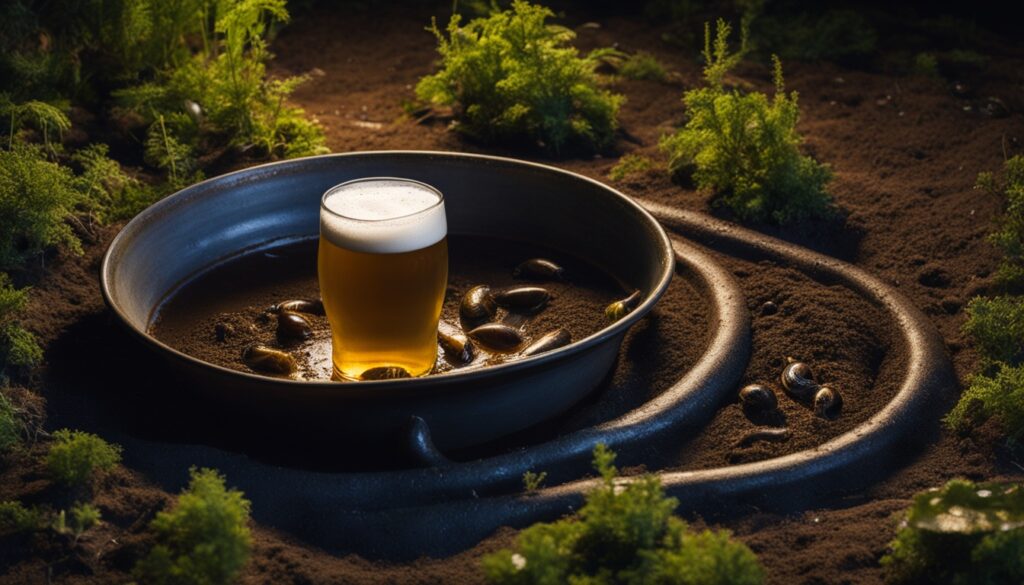
Avoid Chemical Slug Pellets
As a pet owner, it’s important to avoid chemical slug pellets in your garden. These products often have toxic substances like metaldehyde. Metaldehyde poisoning in dogs can cause serious health problems, such as nervous system issues, seizures, and breathing trouble. This is a risk no pet owner wants to face.
It’s safer to use natural, pet-friendly ways to keep your garden slug-free. Options like nematodes, eggshells, and coffee grounds can keep slugs away without harming your dog. Choosing these eco-friendly methods lets you keep your garden safe for your dog.
Metaldehyde Poisoning in Dogs
Metaldehyde, found in some slug pellets, is very dangerous for dogs. Even a little bit can cause serious symptoms, including:
- Nervous system issues
- Seizures
- Breathing difficulties
In bad cases, metaldehyde poisoning can be deadly. As a caring pet owner, it’s key to avoid these chemical products. Instead, choose safer, natural ways to protect your pet.
how to get rid of slugs in garden pet friendly
Protecting your garden and pets from slugs is important. Luckily, there are safe and natural ways to do this. Using physical barriers and biological controls can help you get rid of slugs in a pet-friendly manner.
Eggshells: A Sharp Barrier for Slugs
Using eggshells as a physical barrier is a simple yet effective method. The sharp edges stop slugs from crossing over. Crush your eggshells and sprinkle them around your plants.
Coffee Grounds: A Bitter Deterrent
Coffee grounds are another natural way to keep slugs away. Slugs dislike the strong smell and taste of coffee. Mix one part coffee grounds with five parts water for a spray to apply around your plants.
Rosemary: A Fragrant Slug-Deterring Herb
Adding rosemary to your garden can help keep slugs away. It’s safe for pets and improves soil quality. Rosemary also keeps fleas and ticks away from your dogs.
Nematodes: A Safe Biological Control
For a deeper solution, try nematodes. These microscopic worms attack and kill slugs. They’re safe and effective for pet-friendly slug control.
These natural and pet-friendly methods help manage slugs in your garden safely. A balanced approach ensures a slug-free garden that’s safe for pets and plants.
Nematodes: A Safe Biological Control
Looking for a pet-friendly way to control slugs in your garden? Consider nematodes. These tiny worms are natural enemies of slugs and snails. They are safe for your pets and other wildlife.
Host-Specific Nematodes
Nemaslug is a special nematode designed to target slugs. These nematodes are host-specific. They only attack slugs and snails, not your dogs or other animals. They enter the slug’s body and release a bacteria that causes a deadly disease.
Nematodes are a safe, biological way to fight garden slugs. They are not toxic to pets, unlike chemical slug pellets. This makes them perfect for pet owners who want to keep their gardens slug-free.
“Nematodes are a 100% biological and safe solution for controlling slugs in your garden.”
Apply nematodes in the evening and from spring to autumn. The soil should be moist and well-drained, with a temperature between 5-20°C (41-68°F). This ensures the nematodes work best and kill off the slugs in your garden.
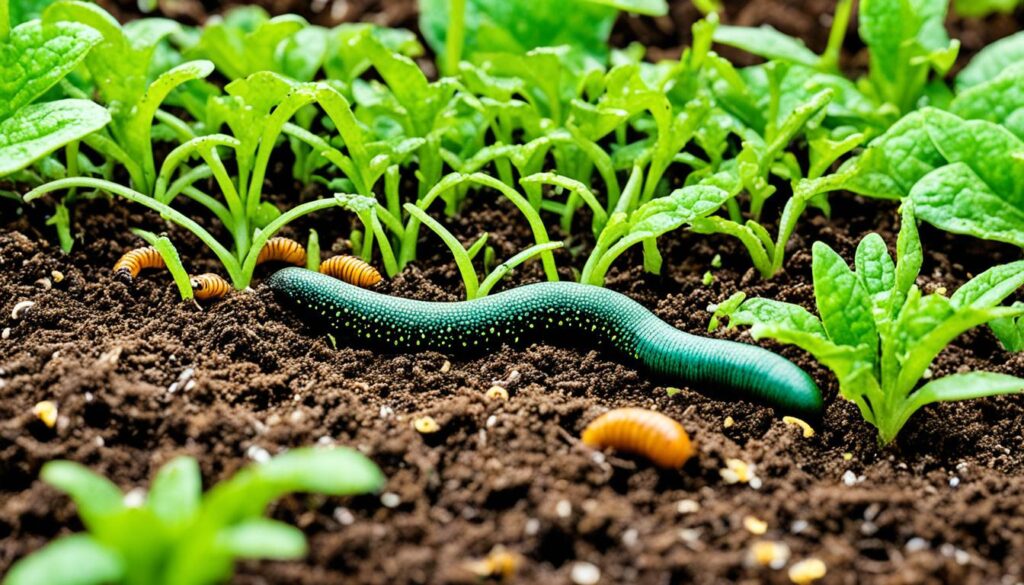
Some studies show nematodes can be effective against slugs. However, results can vary by brand and application. Always choose a trusted supplier and follow the instructions for the best results.
Encourage Natural Predators
You can also encourage natural predators to manage slugs in your garden. Animals like birds, hedgehogs, beetles, and toads eat slugs and snails. By offering food, water, and shelter, you help keep slugs under control without harmful chemicals or traps.
Attracting these predators is a green way to fight slugs. Birds like thrushes, blackbirds, and robins eat slugs. You can help them by putting up bird feeders and baths, and planting native plants for shelter.
Beetles, such as ground beetles and rove beetles, also eat slugs. You can draw them to your garden with natural mulch, leaf litter, and rotting wood. Toads are great at eating slugs too. Make sure your garden has a moist, shaded spot with water for them.
| Natural Slug Predators | How to Attract Them |
|---|---|
| Birds (thrushes, blackbirds, robins) | Provide bird feeders, baths, and plant native shrubs/trees |
| Beetles (ground beetles, rove beetles) | Create natural mulch, leaf litter, and rotting wood habitats |
| Toads | Maintain moist, shaded areas with access to water |
By inviting these predators to your garden, you create a balanced ecosystem. This approach reduces slugs without harmful chemicals. It’s good for your plants and supports your garden’s health and biodiversity.
Grow Slug-Resistant Plants
Choosing plants that slugs don’t like is a great way to keep them out of your garden. Some herbs, flowers, and foliage plants are naturally less appealing to slugs. They have strong scents, thick leaves, or hairy textures that slugs don’t like. Adding these plants to your garden makes it less inviting for slugs but safe for dogs.
Dog-Friendly, Slug-Resistant Plants
Here are some dog-friendly plants that slugs don’t like:
- Lavender – Slugs don’t like the smell and taste of lavender’s leaves and flowers.
- Fuchsias – These flowers have a hairy texture that slugs find unappealing.
- Rosemary – Its strong scent and woody stems keep slugs away.
- Astilbe – This plant has feathery foliage that slugs tend to avoid.
By planting these slug-resistant plants, you can make your garden look great and keep it safe for pets.
| Plant | Slug-Resistance Characteristics | Dog-Friendly |
|---|---|---|
| Lavender | Aromatic leaves and flowers | Yes |
| Fuchsias | Hairy, textured foliage | Yes |
| Rosemary | Strong scent, woody stems | Yes |
| Astilbe | Thick, textured foliage | Yes |
“By incorporating slug-resistant plants into your garden, you can create an environment that is less attractive to these pests while still being safe for your pets.”
Conclusion
There are many ways to keep slugs away from your garden without harming your pets. Using things like eggshells, coffee grounds, and rosemary can help. Also, using nematodes and encouraging natural predators can make your garden less welcoming to slugs.
Choosing plants that are resistant to slugs is another good idea. This way, you can keep your garden healthy and safe for your pets. These methods are safe and eco-friendly, helping you deal with slugs without risks.
It’s important to focus on keeping your pets and the environment safe when dealing with slugs. By using these safe and green methods, you can make your garden beautiful and safe for your pets. This approach ensures a healthy garden and happy pets.
FAQ
What are the dangers of slugs and snails to pets?
Slugs and snails can carry a parasite called lungworm. This parasite can be deadly to dogs if they eat it. It’s important to keep your dog away from these pests in the garden.
What are some signs that my dog has eaten a slug or snail?
If your dog eats a slug or snail, watch for coughing, breathing problems, and feeling tired. They might also have stomach pain or act differently. These signs could mean they have lungworm, which needs quick vet care.
Why should I avoid using chemical slug pellets in my pet-friendly garden?
Chemical slug products often have toxic chemicals like metaldehyde. If pets eat these, they can get very sick. They might have trouble with their nervous system, have seizures, or have trouble breathing. It’s better to use safe ways to keep slugs away.
How can eggshells help get rid of slugs in my garden?
Eggshells are sharp and slugs don’t like to cross them. They also add calcium to the soil. This helps keep slugs away from your plants.
How can coffee grounds be used as a natural slug repellent?
Coffee grounds smell bad to slugs and keep them away. Putting them around your garden can stop slugs from getting to your plants.
How can planting rosemary help with slug control?
Rosemary smells bad to slugs and keeps them away. It’s also good for dogs, helping their gut health and keeping insects away. It’s a safe way to fight slugs.
What are the concerns with using beer traps to control slugs?
Beer traps work by killing slugs, but it’s not a good method. It’s also risky if your dog smells the beer and tries to drink it.
How can nematodes be used as a safe, biological solution for slug control?
Nematodes are tiny worms that eat slugs and snails. Nemaslug is a type of nematode made just for these pests. It goes in the soil and kills slugs safely. Nematodes only harm slugs and snails, not dogs or other pets.
What are some dog-friendly, slug-resistant plants I can grow in my garden?
Try growing lavender, fuchsias, rosemary, and astilbe in your garden. These plants are safe for dogs and don’t attract slugs. They have strong smells, thick leaves, or hairy textures that slugs don’t like.
